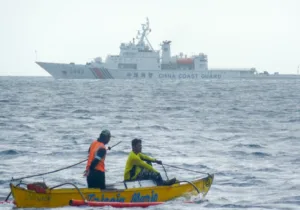Over the past several months and especially after the Paris attacks, the Islamic State (ISIS) has been front-and-center on many Americans’ minds. My heart breaks for ISIS’ victims, including those who have been beheaded, those who live in ISIS-controlled areas, those who died on the Russian flight that ISIS probably bombed, those who died or were wounded during the Paris attacks, and many others. The news media, military, and intelligence communities have and should continue to focus their energy on ISIS, especially over the short term, but the potential for a great-power war is what keeps me awake at night. At worse ISIS can kill thousands in a terrorist attack, but a war between the United States and China could kill millions. Voters should learn about ISIS and consider strategies to counter it, but these voters should also consider strategies and policies to avoid a great-power war with China over the coming decades. While showing how a war between the U.S. and China would play out, P.W. Singer and August Cole’s Ghost Fleet: A Novel of the Next World War is a highly-recommendable read that has already helped focus minds on this topic, both inside the Beltway and beyond.
The novel is each author’s first fiction publication. P.W. Singer– a strategist at New America Foundation who also wrote Wired for War– and August Cole– a nonresident senior fellow at the Atlantic Council and former reporter at the Wall Street Journal who broke the story that foreign spies had hacked into the U.S. Joint Strike Fighter (F-35) program- normally write more wonky articles that honestly have a fairly limited audience amongst the general public. However, many more people are likely to read a novel written in the style of World War Z. There is even a sexy surfer-girl serial killer, which probably doesn’t hurt attracting male readers aged 18-35, or even older. This use of fiction is admirable because it can be so effective in reaching a much wider audience that the author’s normal non-fiction works could not. Before getting on a flight, a senator may promise his or her legislative assistant to read a dry policy briefing or a report about aircraft carrier’s diminishing influence as China’s military develops more effective missiles. “Sure, I’ll read this report… as soon as I finish binge-watching Game of Thrones on my iPad.” This senator is much more likely to read a thriller novel that gives intimate details about sailors, civilians, insurgents, venture capitalists, spies, computer programmers, annoying teenagers, traitors, and others working with and against each other in a future world war. Even if the novel’s material is nothing new for a military expert or academic, reading the book to understand how the authors presented their arguments to the widest possible audience would be worthwhile.
While describing a potential, not inevitable, world war between the U.S. and China sometime around 2030, Singer and Cole had one key rule: every piece of technology mentioned had to be in research and development phases, in a prototype stage, or in operation. There is no magical wizardry to save the characters. The authors’ backgrounds in covering military technology become obvious when they are able to mix emerging technology’s possible capabilities and shortcomings into the novel’s plot. Their expertise thus puts this novel in a class of its own, even if there are many other futurist books that speculate on what may happen during a new world war.
One of the book’s strongest characteristics is how the authors used exhaustive research, which included interviews not only with U.S. military officers but also with Chinese generals, Anonymous hackers, and many others. In order to determine what type of aircraft could be used on China’s new aircraft carrier now under construction, the authors analyzed photos Chinese citizens inadvertently took of the ship while taking a selfie. The result is a novel with over 400 endnotes, many of which tell readers exactly where to find the open-source information about each piece of technology mentioned in the story. This inclusion helps clarify that the authors are not using classified sources, even if the American government may not want to alert the general public to certain technologies or techniques. For instance, in one scene the Chinese hack into a Defense Intelligence Agency’s (DIA) computer system not connected to the internet. Interestingly, P.W. Singer briefed the DIA on this process while in the facility mentioned in the book. The U.S. government may protest that the novel includes this scene, but several news sources have already reported on this technique and how the U.S. has used it on Russia and China. A group of Israeli students, who clearly have fewer resources than government spies, have even been able to replicate the attack. The American public may not be aware of how vulnerable government computer networks are, but the Chinese government is certainly not so ignorant.
While combining this research, the authors’ expertise, and the fiction’s speculation, Ghost Fleet is able to consider some troubling questions that help readers better understand the implications of a possible great-power war. For instance, nuclear deterrence has been credited for preventing a great-power war between the United States and the Soviet Union, but should citizens assume a war with China would automatically go nuclear, or would both sides use everything but nukes to avoid mutual destruction? Also, many Americans assume companies like Wal-Mart and Ford are “American” because they have P.O. boxes and some offices on American territory, but do multinational corporations have a nationality? How would these companies react when two of their biggest markets are at war with each other, and how would investors who are not part of the war, whether in Europe or India, want these companies to interact with China and the U.S.? How would NATO respond to a Chinese attack on the U.S.? Would the alliance uphold Article V, or would the alliance fall apart if countries like France and Germany decide defending the U.S. is not worth losing their trade relationship with China? The United Kingdom’s warming towards China during President Xi Jinping’s visit in October does not bode well for America. Would America’s aircraft carriers, which are the cornerstone of U.S. geopolitical power, be relevant if China’s missiles can sink these ships before the carriers’ aircraft are in range to attack the missile launchers? Would the F-35 be worth its expensive price tag? Would the United States have a bad day during a war with China?
Some may assume that war with China is an interesting curiosity but not a real possibility. China’s leaders are intelligent enough to understand their economy is closely linked to America’s economy, and a war would be mutually-destructive. One could hope that economic mutual-dependence ensures peace, but Britain and Germany were also major trading partners before the First World War. Internal political calculations in both countries may trump economic logic when deciding whether or not to risk war. Diplomatic miscalculations could also escalate into war unintentionally, especially if either or both sides believe that a war would be “short”, “sharp”, and easily winnable, which P.W. Singer has insisted is the attitude he has heard from American and Chinese military leaders during his research. He cites a poll that shows 74% of Chinese citizens think they could win a war with the United States. If this poll is an accurate representation, then why wouldn’t the Chinese push for a confrontation with the U.S. if America disrespects their interests? Chinese soldiers complain about “peace disease”, which means that they are weak because they have never fought in a war. The People’s Daily, the Chinese Communist Party’s official newspaper, said that war with the U.S. is “inevitable” if America does not accept China’s territorial claims over the South China Sea, including artificial islands. There is also a large culture of Chinese military fiction with hundreds of books, including one written by a People’s Liberation Army (PLA) officer, explaining to millions of Chinese readers how they would win a war against America. Even if the Chinese government uses confrontational words about the U.S. only for domestic political purposes, observers should not ignore the risks of potential war, especially as the opportunities for disagreement and confrontation increase over the next couple decades.
My own criticism of the book has less to do with whether war with China is a serious risk but whether the war would be as small as the novel suggests. The title suggests that the story is about the “next world war”, but the contents imply that relatively few allies would actually help the United States against China, which means the book’s war is not a “world war” but a “great-power war”. However, the novel may have become too complicated for the reader to follow if it had included battles on other continents, so limiting the fight to the Pacific Ocean and between two major countries was necessary. Yet this limitation implies that war would be much less deadly than reality may prove.
While considering how deadly this war could be, one should consider how the United States could accommodate China’s inevitable rise while still ensuring the global order that has allowed most of the world, including the United States, to prosper in a relatively stable peace continues (in spite of the post-9/11 developments, the past couple decades have been the most prosperous and most peaceful in recorded history). There are some situations, such as the one with ISIS, which likely have no solution other than a military one, but the situation with China is in such a place that over the coming decade the groundwork could be laid to avoid military confrontation. American Christian citizens should be able and willing to use war when necessary, but there is a good case to be made that laying the foundation for a constructive relationship with China could make direct war unnecessary and thus help save the lives of millions who would otherwise die in a great-power war. Considering these policies today can help prevent the U.S. from overreacting or acting unwisely if and when a crisis occurs. Future articles could help expand on this important topic.
Mark Melton is the Deputy Editor for Providence. He earned his Master’s degree in International Relations from the University of St. Andrews and has a specialization in civil conflict and European politics. He earned his Bachelor’s degree in Foreign Language & International Trade from Mississippi College. Prior to moving to DC, he worked as a political science adjunct professor at community colleges in Mississippi. He is Providence’s resident Millennial (don’t let the premature salt and pepper hair fool you- he’s still a Millennial).
Photo Credit: Representation of USS Zumwalt, U.S. Navy.






